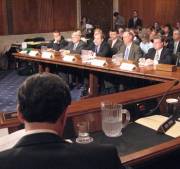 Yesterday, the Obama administration announced a new effort to curb baseless patent lawsuits, which it believes are stifling innovation and economic activity. The new initiative would take five actions under the President’s Executive authority, and also makes seven legislative recommendations intended, “to protect innovators from frivolous litigation and ensure the highest-quality patents in our system.”
Yesterday, the Obama administration announced a new effort to curb baseless patent lawsuits, which it believes are stifling innovation and economic activity. The new initiative would take five actions under the President’s Executive authority, and also makes seven legislative recommendations intended, “to protect innovators from frivolous litigation and ensure the highest-quality patents in our system.”
 Perhaps the most important term in any standards organization’s Intellectual Property Policy (IPR) policy is the acronym “RAND,” standing for “reasonable and non-discriminatory” (in Europe, they add an “F” – for “fair” - at the front end, yielding “FRAND,” but the meaning is the same). Virtually every other term in such a policy will appear in one of many variations from policy to policy, and these definitions can be quite lengthy and precise. But the definition of F/RAND is always word for word the same – never is a different term used, nor is any additional elaboration provided to explain exactly what “fair” or “reasonable” are intended to mean.
Perhaps the most important term in any standards organization’s Intellectual Property Policy (IPR) policy is the acronym “RAND,” standing for “reasonable and non-discriminatory” (in Europe, they add an “F” – for “fair” - at the front end, yielding “FRAND,” but the meaning is the same). Virtually every other term in such a policy will appear in one of many variations from policy to policy, and these definitions can be quite lengthy and precise. But the definition of F/RAND is always word for word the same – never is a different term used, nor is any additional elaboration provided to explain exactly what “fair” or “reasonable” are intended to mean.
The result is that when two parties – the owner of a patent claim that an implementer of a standard can’t avoid infringing (an “Essential Claim”) and a party that wants to implement the standard – can’t agree on what the boundaries of these words should be, a third party is needed to settle the dispute.
Have you discovered The Alexandria Project?
 On Tuesday, OASIS made an extremely rare announcement for an information technology consortium: that it has successfully completed the process of becoming accredited by the American National Standards Institute (ANSI). As a result, it is now able to submit its standards to ANSI for recognition as American National Standards (ANS). And also to directly submit its standards for adoption by ISO and IEC. This is a milestone that’s worthy of note, despite the fact that over 200 standards setting organizations (SSOs) have achieved a similar status in the past.
On Tuesday, OASIS made an extremely rare announcement for an information technology consortium: that it has successfully completed the process of becoming accredited by the American National Standards Institute (ANSI). As a result, it is now able to submit its standards to ANSI for recognition as American National Standards (ANS). And also to directly submit its standards for adoption by ISO and IEC. This is a milestone that’s worthy of note, despite the fact that over 200 standards setting organizations (SSOs) have achieved a similar status in the past.
 Yesterday the Antitrust Division of the U.S. Department of Justice (DoJ) and the U.S. Patent Trademark Office (USPTO) united in issuing a rare joint policy statement on Remedies for Standards-Essential Patents Subject to Voluntary F/RAND Commitments. As the title suggests, the policy focuses on those patent claims that would be necessarily infringed by the implementation of a standard (so-called standards essential patents, or “SEPs”), where the owner of the claims has pledged to make the claims available on “fair, reasonable and non-discriminatory” (or “F/RAND”) terms. More specifically, the policy statement addresses the question of whether, and if so when, the owner of SEPs should be entitled to ask the International Trade Commission (ITC) for an injunction to bar the importation of products implementing the standard in question.
Yesterday the Antitrust Division of the U.S. Department of Justice (DoJ) and the U.S. Patent Trademark Office (USPTO) united in issuing a rare joint policy statement on Remedies for Standards-Essential Patents Subject to Voluntary F/RAND Commitments. As the title suggests, the policy focuses on those patent claims that would be necessarily infringed by the implementation of a standard (so-called standards essential patents, or “SEPs”), where the owner of the claims has pledged to make the claims available on “fair, reasonable and non-discriminatory” (or “F/RAND”) terms. More specifically, the policy statement addresses the question of whether, and if so when, the owner of SEPs should be entitled to ask the International Trade Commission (ITC) for an injunction to bar the importation of products implementing the standard in question.
Check out my new Author's Blog: Tales of Adversego
 The big news in the tech world yesterday was the announcement by the U.S. Federal Trade Commission (FTC) that it was terminating its review of Google’s business practices without requiring significant changes to the search giant’s advertising practices. While that facet of the story has been extensively covered in many other venues, another important aspect of the FTC’s settlement has received little attention – Google’s agreement to enter into binding arbitration with implementers objecting to its offered license terms. Only if the would-be license refused to enter arbitration, or refuses to honor the arbitrators decision, can can Google seek injunctive relief in the future in connection with any “standards essential patents” (SEPs) that it owns.
The big news in the tech world yesterday was the announcement by the U.S. Federal Trade Commission (FTC) that it was terminating its review of Google’s business practices without requiring significant changes to the search giant’s advertising practices. While that facet of the story has been extensively covered in many other venues, another important aspect of the FTC’s settlement has received little attention – Google’s agreement to enter into binding arbitration with implementers objecting to its offered license terms. Only if the would-be license refused to enter arbitration, or refuses to honor the arbitrators decision, can can Google seek injunctive relief in the future in connection with any “standards essential patents” (SEPs) that it owns.
Have you discovered The Alexandria Project?
 Governments certainly have more than enough to concern themselves with these days – financial crises, natural disasters and terrorism, to name just a few. Given that’s the case, it’s surprising that so many are finding the time to worry about what kind of standards the products and services they purchase comply with. But they are.
Governments certainly have more than enough to concern themselves with these days – financial crises, natural disasters and terrorism, to name just a few. Given that’s the case, it’s surprising that so many are finding the time to worry about what kind of standards the products and services they purchase comply with. But they are.
That’s the case in the EU, where the final terms of version 2.0 of the European Interoperability Framework (EIF) were the subject of heated debate, resulting in a watered down definition of what should be regarded as acceptable standards for use in enabling communications between EU member nations. It’s also the case within those EU member states that are considering adopting definitions similar to the original formulation that appeared in the original, 2004 version of the EIF.
"Alice laughed: "There's no use trying," she said; "one can't believe impossible things."
"I daresay you haven't had much practice," said the Queen. "When I was younger, I always did it for half an hour a day. Why, sometimes I've believed as many as six impossible things before breakfast."
Alice in Wonderland.
Have you discovered The Alexandria Project?
 Now that the jury has given Apple almost everything it asked for in its infringement suit against Samsung, what should we expect to happen next? I think it's a given that Samsung will appeal. Given the damages awarded and the obvious determination of Apple to defend its patents, Samsung has little choice but to press forward wherever it can in court.
Now that the jury has given Apple almost everything it asked for in its infringement suit against Samsung, what should we expect to happen next? I think it's a given that Samsung will appeal. Given the damages awarded and the obvious determination of Apple to defend its patents, Samsung has little choice but to press forward wherever it can in court.
This doesn't necessarily mean that it's ultimate goal is to prevail through litigation, because it will constantly be running into existing and new Apple patents for so long as they remain competitors in the marketplace. Ultimately, what should make the best sense for Samsung is to negotiate the most comprehensive patent cross license with Apple that it can, and maintaining a full court press throughout the world's legal venues is the best way to ensure that it can get the best terms possible in such a license.
Have you discovered The Alexandria Project?
 If you've been following the ongoing mobile operating system wars between companies like Motorola Mobility, Apple, Google and Samsung, you may recall that the biggest hammer a patent owner can wield is to prevent a competitor from selling a product. In the regular courts, this is achieved by pbtaining an injunction, which is a court order that bars such sales from occurring. In this situation, the patent owner claims that it can't be adequately compensated after the fact by damages.
If you've been following the ongoing mobile operating system wars between companies like Motorola Mobility, Apple, Google and Samsung, you may recall that the biggest hammer a patent owner can wield is to prevent a competitor from selling a product. In the regular courts, this is achieved by pbtaining an injunction, which is a court order that bars such sales from occurring. In this situation, the patent owner claims that it can't be adequately compensated after the fact by damages.
But the US courts haven't been favorable to this approach since a key Supreme Court ruling in 2006, leading companies to seek an alternate route to a similar result: a judgment by the International Trade Commission (ITC), barring the competitor from importing any product into the U.S. that infringes on the patent. If that patent is essential for implementing a standard that is, in turn, essential to performing the device's function, then you've effectively barred its competitor from being a competitor at all - at least in the U.S.
 Anyone paying attention to technology news lately knows that the Titans are clashing for control, or at least a share of the monetary rewards, of the mobile marketplace. When technology historians look back on this era, they'll likely see this as a time when the tectonic plates suddenly shifted, wrenching apart corporate monopolies and rearranging the terrain upon which the next great age of technical innovation and adoption will play out. These sudden shifts have predictably sent tremors reverberating across the competitive landscape.
Anyone paying attention to technology news lately knows that the Titans are clashing for control, or at least a share of the monetary rewards, of the mobile marketplace. When technology historians look back on this era, they'll likely see this as a time when the tectonic plates suddenly shifted, wrenching apart corporate monopolies and rearranging the terrain upon which the next great age of technical innovation and adoption will play out. These sudden shifts have predictably sent tremors reverberating across the competitive landscape.
 At intervals, the Federal Trade Commission (FTC) and Department of Justice (DoJ) have undertaken public initiatives intended to support the standards development process from the antitrust perspective. In each case, I've found the regulators to be open minded and genuinely interested in understanding the marketplace. Often, the goal of their information gathering efforts is to later issue guidelines that encourage good behavior, and make clear what they consider to be over the line. The result is that it makes it easier and safer for stakeholders to participate actively in the standard setting process. Regulators in the European Union follow the same practice.
At intervals, the Federal Trade Commission (FTC) and Department of Justice (DoJ) have undertaken public initiatives intended to support the standards development process from the antitrust perspective. In each case, I've found the regulators to be open minded and genuinely interested in understanding the marketplace. Often, the goal of their information gathering efforts is to later issue guidelines that encourage good behavior, and make clear what they consider to be over the line. The result is that it makes it easier and safer for stakeholders to participate actively in the standard setting process. Regulators in the European Union follow the same practice.
Last week, the FTC announced a new standards development process fact-finding effort, this time announcing a workshop intended to help them better understand whether "patent holdup" is causing a problem in the marketplace. It's open to the public, and you're free to submit written comments as well.
 Yesterday, the Obama administration announced a new effort to curb baseless patent lawsuits, which it believes are stifling innovation and economic activity. The new initiative would take five actions under the President’s Executive authority, and also makes seven legislative recommendations intended, “to protect innovators from frivolous litigation and ensure the highest-quality patents in our system.”
Yesterday, the Obama administration announced a new effort to curb baseless patent lawsuits, which it believes are stifling innovation and economic activity. The new initiative would take five actions under the President’s Executive authority, and also makes seven legislative recommendations intended, “to protect innovators from frivolous litigation and ensure the highest-quality patents in our system.”  Perhaps the most important term in any standards organization’s Intellectual Property Policy (IPR) policy is the acronym “RAND,” standing for “reasonable and non-discriminatory” (in Europe, they add an “F” – for “fair” - at the front end, yielding “FRAND,” but the meaning is the same). Virtually every other term in such a policy will appear in one of many variations from policy to policy, and these definitions can be quite lengthy and precise. But the definition of F/RAND is always word for word the same – never is a different term used, nor is any additional elaboration provided to explain exactly what “fair” or “reasonable” are intended to mean.
Perhaps the most important term in any standards organization’s Intellectual Property Policy (IPR) policy is the acronym “RAND,” standing for “reasonable and non-discriminatory” (in Europe, they add an “F” – for “fair” - at the front end, yielding “FRAND,” but the meaning is the same). Virtually every other term in such a policy will appear in one of many variations from policy to policy, and these definitions can be quite lengthy and precise. But the definition of F/RAND is always word for word the same – never is a different term used, nor is any additional elaboration provided to explain exactly what “fair” or “reasonable” are intended to mean. Yesterday the Antitrust Division of the U.S. Department of Justice (DoJ) and the U.S. Patent Trademark Office (USPTO) united in issuing a rare joint policy statement on
Yesterday the Antitrust Division of the U.S. Department of Justice (DoJ) and the U.S. Patent Trademark Office (USPTO) united in issuing a rare joint policy statement on  The big news in the tech world yesterday was the announcement by the U.S. Federal Trade Commission (FTC) that it was terminating its review of Google’s business practices without requiring significant changes to the search giant’s advertising practices. While that facet of the story has been extensively covered in many other venues, another important aspect of the FTC’s settlement has received little attention – Google’s agreement to enter into binding arbitration with implementers objecting to its offered license terms. Only if the would-be license refused to enter arbitration, or refuses to honor the arbitrators decision, can can Google seek injunctive relief in the future in connection with any “standards essential patents” (SEPs) that it owns.
The big news in the tech world yesterday was the announcement by the U.S. Federal Trade Commission (FTC) that it was terminating its review of Google’s business practices without requiring significant changes to the search giant’s advertising practices. While that facet of the story has been extensively covered in many other venues, another important aspect of the FTC’s settlement has received little attention – Google’s agreement to enter into binding arbitration with implementers objecting to its offered license terms. Only if the would-be license refused to enter arbitration, or refuses to honor the arbitrators decision, can can Google seek injunctive relief in the future in connection with any “standards essential patents” (SEPs) that it owns. Governments certainly have more than enough to concern themselves with these days – financial crises, natural disasters and terrorism, to name just a few. Given that’s the case, it’s surprising that so many are finding the time to worry about what kind of standards the products and services they purchase comply with. But they are.
Governments certainly have more than enough to concern themselves with these days – financial crises, natural disasters and terrorism, to name just a few. Given that’s the case, it’s surprising that so many are finding the time to worry about what kind of standards the products and services they purchase comply with. But they are. Now that the jury has given Apple almost everything it asked for in its infringement suit against Samsung, what should we expect to happen next? I think it's a given that Samsung will appeal. Given the damages awarded and the obvious determination of Apple to defend its patents, Samsung has little choice but to press forward wherever it can in court.
Now that the jury has given Apple almost everything it asked for in its infringement suit against Samsung, what should we expect to happen next? I think it's a given that Samsung will appeal. Given the damages awarded and the obvious determination of Apple to defend its patents, Samsung has little choice but to press forward wherever it can in court.  If you've been following the ongoing mobile operating system wars between companies like Motorola Mobility, Apple, Google and Samsung, you may recall that
If you've been following the ongoing mobile operating system wars between companies like Motorola Mobility, Apple, Google and Samsung, you may recall that Anyone paying attention to technology news lately knows that the Titans are clashing for control, or at least a share of the monetary rewards, of the mobile marketplace. When technology historians look back on this era, they'll likely see this as a time when the tectonic plates suddenly shifted, wrenching apart corporate monopolies and rearranging the terrain upon which the next great age of technical innovation and adoption will play out. These sudden shifts have predictably sent tremors reverberating across the competitive landscape.
Anyone paying attention to technology news lately knows that the Titans are clashing for control, or at least a share of the monetary rewards, of the mobile marketplace. When technology historians look back on this era, they'll likely see this as a time when the tectonic plates suddenly shifted, wrenching apart corporate monopolies and rearranging the terrain upon which the next great age of technical innovation and adoption will play out. These sudden shifts have predictably sent tremors reverberating across the competitive landscape. At intervals, the Federal Trade Commission (FTC) and Department of Justice (DoJ) have undertaken public initiatives intended to support the standards development process from the antitrust perspective. In each case, I've found the regulators to be open minded and genuinely interested in understanding the marketplace. Often, the goal of their information gathering efforts is to later issue guidelines that encourage good behavior, and make clear what they consider to be over the line. The result is that it makes it easier and safer for stakeholders to participate actively in the standard setting process. Regulators in the European Union follow the same practice
At intervals, the Federal Trade Commission (FTC) and Department of Justice (DoJ) have undertaken public initiatives intended to support the standards development process from the antitrust perspective. In each case, I've found the regulators to be open minded and genuinely interested in understanding the marketplace. Often, the goal of their information gathering efforts is to later issue guidelines that encourage good behavior, and make clear what they consider to be over the line. The result is that it makes it easier and safer for stakeholders to participate actively in the standard setting process. Regulators in the European Union follow the same practice